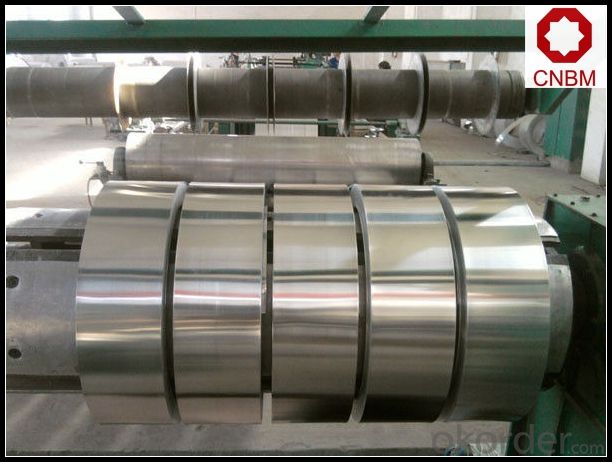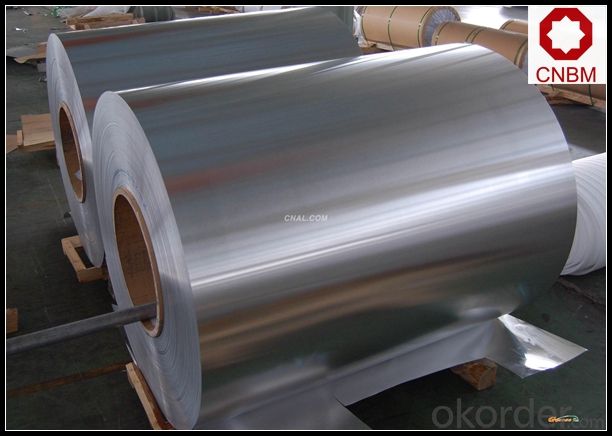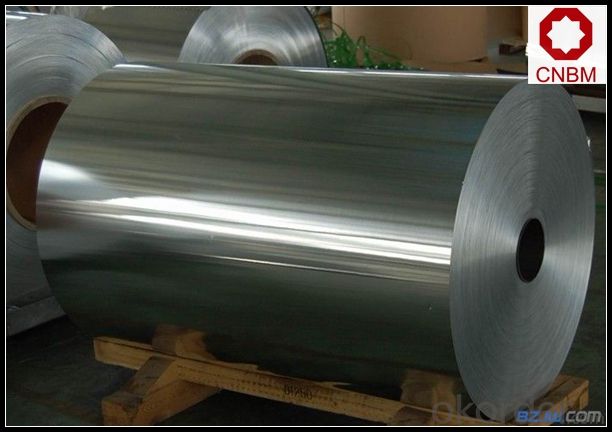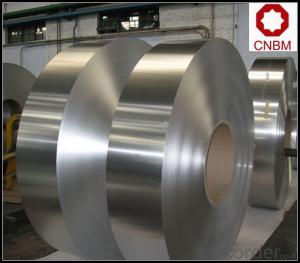Aluminum Coil Manufacturers in China Factory Supply
- Loading Port:
- Shanghai
- Payment Terms:
- TT OR LC
- Min Order Qty:
- 5 m.t.
- Supply Capability:
- 10000 m.t./month
OKorder Service Pledge
OKorder Financial Service
You Might Also Like
Item specifice
1. Specification of Aluminum Coil Manufacturers in China Factory Supply
1) Alloy | 1050, 1060,1100, 3003 3004 3105 3A21 5005 5052 etc |
2) Temper | O/H12/H14/H1/H18/H32/H34/H36/H38//H111/H112/H116/H321/T6/T651/T3/T351 etc |
3) Thickness | 0.1mm to 6mm |
4) Width | 20mm to 3300mm |
5) Coil weight | 100kgs to 6 tons depends on actual requirement |
6) Core material | Aluminum or paper |
7) Coil Inner diameter | 75mm, 150mm, 200mm, 300mm, 405mm, 505mm or as required |
8) Protective film can be added
2. Application of Aluminum Coil Manufacturers in China Factory Supply
(1).Interior: wall cladding, ceilings, bathrooms, kitchens and balconies, shutters, doors...
(2).Exterior: wall cladding, facades, roofing, canopies, tunnels,column covers , renovations...
(3).Advertisement: display platforms, signboards, fascia, shop fronts...
3. Feature of Aluminum Coil Manufacturers in China Factory Supply
*Such coil is specially designed to replace aluminum ingot, due to the high export tax of aluminum ingot, the coil has better price than ingot.
*This type of coil can fit customer's remelting furnace just like ingot, no need to make any change to the production line that was previously used for ingot. The standard coil size and weight is very suitable for the feed gate of furnace.
*This type of coil causes less material wastage than ingot when remelted.
*Our coil is made directly from ore, no need to go though the ingot making process, quality is much better than other suppliers who use ingot scrap to make coil.
Be free from Oil Stain, Dent, Inclusion, Scratches, Stain, Oxide Dicoloration, Breaks, Corrosion, Roll Marks, Dirt Streaks and other defect which will interfere with use
4. Certificate:
SGS and ROHS(if client request, paid by client), MTC(plant provided), Certificate of Origin(FORM A, FORM E, CO), Bureau Veritas and SGS (if client request, paid by client), CIQS certificate
5. Image of Aluminum Coil Manufacturers in China Factory Supply



6. Package and shipping of Aluminum Coil Manufacturers in China Factory Supply
eye to wall
eye to the wall
with wood pallet (wooded case also available)
7. FAQ
1) What is the delivery time?
Dpends on actual order, around 20 to 35 days
2)What is the QC system:
We have QC staff of 20 persons and advanced equipment, each production is with MTC traced from Aluminum ingot lot.
3) What market do you mainly sell to?
Australia, America, Asia, Middle East, Western Europe, Africa etc
- Q:What are the different coil slitting widths available for aluminum coils?
- The specific requirements and industry standards determine the various coil slitting widths available for aluminum coils. The width range for slitting aluminum coils can vary from as narrow as 0.5 inches to as wide as 72 inches or more. The coil slitting facility's equipment and capabilities determine the exact range of available widths. These widths are tailored for different applications and industries, including automotive, construction, packaging, and electronics. Common coil slitting widths for aluminum coils are 12 inches, 24 inches, 36 inches, and 48 inches. However, it is essential to note that custom slitting widths can be requested to meet unique project needs.
- Q:How are aluminum coils used in the electrical industry?
- Aluminum coils are widely used in the electrical industry for various applications such as transformers, motors, generators, and electrical transmission systems. These coils are used to create electromagnetic fields, which are essential for the functioning of these electrical devices. Additionally, aluminum coils are preferred due to their lightweight, high thermal conductivity, and cost-effectiveness compared to other materials.
- Q:What is the typical yield strength of aluminum coils?
- The typical yield strength of aluminum coils can vary depending on the specific alloy and temper used. However, for many common aluminum alloys, the yield strength typically ranges from 15,000 psi to 40,000 psi (100 MPa to 275 MPa). It is important to note that this is a general range, and there can be variations within different aluminum coil products. Additionally, the yield strength can also be influenced by factors such as the thickness and processing conditions of the coil.
- Q:Are aluminum coils suitable for pharmaceutical packaging?
- Yes, aluminum coils are suitable for pharmaceutical packaging due to their excellent barrier properties, lightweight nature, and ability to protect sensitive drugs from external factors like moisture, light, and oxygen. Additionally, aluminum coils are easily moldable, making them ideal for creating customized packaging shapes and sizes to meet specific pharmaceutical requirements.
- Q:What can I get easily at Home Depot that will successfully bond rubber to aluminum?? I have tried several things with no success! Surely, there must be some sort of construction adhesive to do the job.Thanks!
- Go to an automotive parts store, like Pep Boys- they sell a gasket adhesive for rubber trim on cars that works very well- Also, there is an outstandingly strong spray adhesive called 3M-77 - buy it in the paint sections at Lowes( about $13.00 a can- but it is a big can!) Spray on the aluminum, spray on the rubber- let dry for about ten minutes and attach- Be careful- 77 is a one way adhesive- once it is stuck, no repositioning it- it's stuck for good! Do not wear latex or rubber gloves- they will stick, too- wear cheap cotton or jersey gloves while working with this kind of instant adhesive. BTW, be sure to clean the aluminum and rubber with solvent before applying the adhesive- any oil and the fix won't work.
- Q:Can aluminum coils be formed into different shapes?
- Aluminum coils possess the capability to assume diverse configurations. Such metal, known for its high malleability, exhibits an ability to undergo bending, shaping, and forming without fracturing. This particular attribute deems it an optimal material for myriad applications necessitating flexibility and adaptability. Aluminum coils, employing a myriad of techniques like bending, rolling, stamping, extrusion, or even specialized machinery like a coil forming machine, can be fashioned into an array of shapes. These shapes encompass sheets, plates, tubes, wires, or intricate three-dimensional structures. The capacity to mold aluminum coils into assorted forms renders it an exceptional choice for sectors such as construction, automotive, aerospace, and manufacturing, where customized parts and components are frequently required.
- Q:How are aluminum coils protected against transportation damage?
- The prevention of transportation damage to aluminum coils is ensured by manufacturers and transportation companies through various measures. Primary among these measures is the packaging and storage of the coils in robust crates or pallets, which act as a barrier against external impact and guarantee stability during transit. These crates, which are typically constructed from wood or metal, are specifically designed to withstand the challenges of transportation. To provide further protection against damage, the coils are often enveloped in protective materials like plastic or stretch film. This supplementary layer of packaging serves to prevent scratches, abrasions, and moisture damage that may occur during handling and transportation. In addition, the coils are frequently secured within the crates or pallets using straps or bands, thereby averting any potential movement or collision with other objects. In order to create a cushioning effect within the packaging, manufacturers frequently employ padding materials such as foam or cardboard inserts. These inserts absorb shock and vibration during transit, thereby reducing the likelihood of damage caused by impacts or sudden movements. Transportation companies also play a critical role in ensuring the secure transportation of aluminum coils. They utilize specialized handling equipment, such as forklifts or cranes, to minimize the risk of mishandling and dropping the coils. Furthermore, they meticulously load and secure the coils within shipping containers or trucks, ensuring proper bracing and immobilization to prevent shifting or rolling during transportation. In conclusion, the protection of aluminum coils from transportation damage is achieved through the utilization of robust packaging, protective wraps, padding materials, and appropriate handling techniques. These measures aim to minimize the risk of scratches, dents, and other forms of damage caused by impacts, vibrations, or mishandling during transit.
- Q:How are aluminum coils installed in various applications?
- Aluminum coils are installed in various applications using different methods depending on specific requirements and the nature of the application. Here are a few commonly used methods for aluminum coil installation: 1. HVAC Systems: Aluminum coils are commonly used for heat transfer in HVAC systems. They are typically installed inside air handling or condensing units. Installation involves securing the coils, connecting them to refrigerant lines, and ensuring proper insulation and sealing to prevent leaks. 2. Refrigeration: Aluminum coils are used for heat transfer and cooling in refrigeration systems. They are usually installed within evaporator or condenser units. The installation process includes securely mounting the coils, connecting them to refrigerant lines, and ensuring proper insulation and sealing. 3. Heat Exchangers: Aluminum coils are widely used in heat exchangers for various industrial applications. They are installed within shell and tube or plate and frame heat exchanger units. Installation involves positioning the coils, connecting them to piping and fittings, and ensuring proper alignment and sealing. 4. Automotive Radiators: Aluminum coils are extensively used in automotive radiators for efficient heat dissipation. Installation involves mounting the coils within the radiator assembly, connecting them to coolant lines, and ensuring proper alignment and sealing to prevent leakage. 5. Electrical Transformers: Aluminum coils are used for efficient power transmission and electrical insulation in electrical transformers. Installation involves winding the coils around the transformer core, connecting them to terminals, and ensuring proper insulation and grounding. In all these applications, it is essential to adhere to industry standards and guidelines to achieve proper aluminum coil installation. This includes considering factors such as structural support, alignment, connection integrity, insulation, and sealing to ensure optimal performance and longevity.
- Q:Can aluminum coils be used in the production of electrical conductors?
- Yes, aluminum coils can be used in the production of electrical conductors. Aluminum is an excellent conductor of electricity, with approximately 61% conductivity compared to copper. It is lightweight, cost-effective, and has a high melting point, making it suitable for various electrical applications. Aluminum coils are commonly used in the manufacturing of power transmission lines, electrical cables, and transformer windings. However, it is worth noting that aluminum has a lower tensile strength compared to copper, so it may require a larger cross-sectional area to achieve the same electrical conductivity. Additionally, aluminum coils may require additional surface treatments or coatings to prevent oxidation and ensure long-term performance.
- Q:Can aluminum coils be used for solar panel installations?
- Indeed, solar panel installations can utilize aluminum coils. Aluminum, renowned for its lightweight nature, durability, and corrosion resistance, is frequently employed within the solar industry. As framing materials for solar panel mounting, aluminum coils furnish a robust and enduring support structure. Moreover, they boast exceptional heat dissipation properties, crucial for optimizing solar panel efficiency. Notably, aluminum coils are also user-friendly, rendering the installation process more convenient. All in all, opting for aluminum coils in solar panel installations proves to be a widely favored and efficient decision.
1. Manufacturer Overview |
|
|---|---|
| Location | |
| Year Established | |
| Annual Output Value | |
| Main Markets | |
| Company Certifications | |
2. Manufacturer Certificates |
|
|---|---|
| a) Certification Name | |
| Range | |
| Reference | |
| Validity Period | |
3. Manufacturer Capability |
|
|---|---|
| a)Trade Capacity | |
| Nearest Port | |
| Export Percentage | |
| No.of Employees in Trade Department | |
| Language Spoken: | |
| b)Factory Information | |
| Factory Size: | |
| No. of Production Lines | |
| Contract Manufacturing | |
| Product Price Range | |
Send your message to us
Aluminum Coil Manufacturers in China Factory Supply
- Loading Port:
- Shanghai
- Payment Terms:
- TT OR LC
- Min Order Qty:
- 5 m.t.
- Supply Capability:
- 10000 m.t./month
OKorder Service Pledge
OKorder Financial Service
Similar products
New products
Hot products
Hot Searches
Related keywords




























